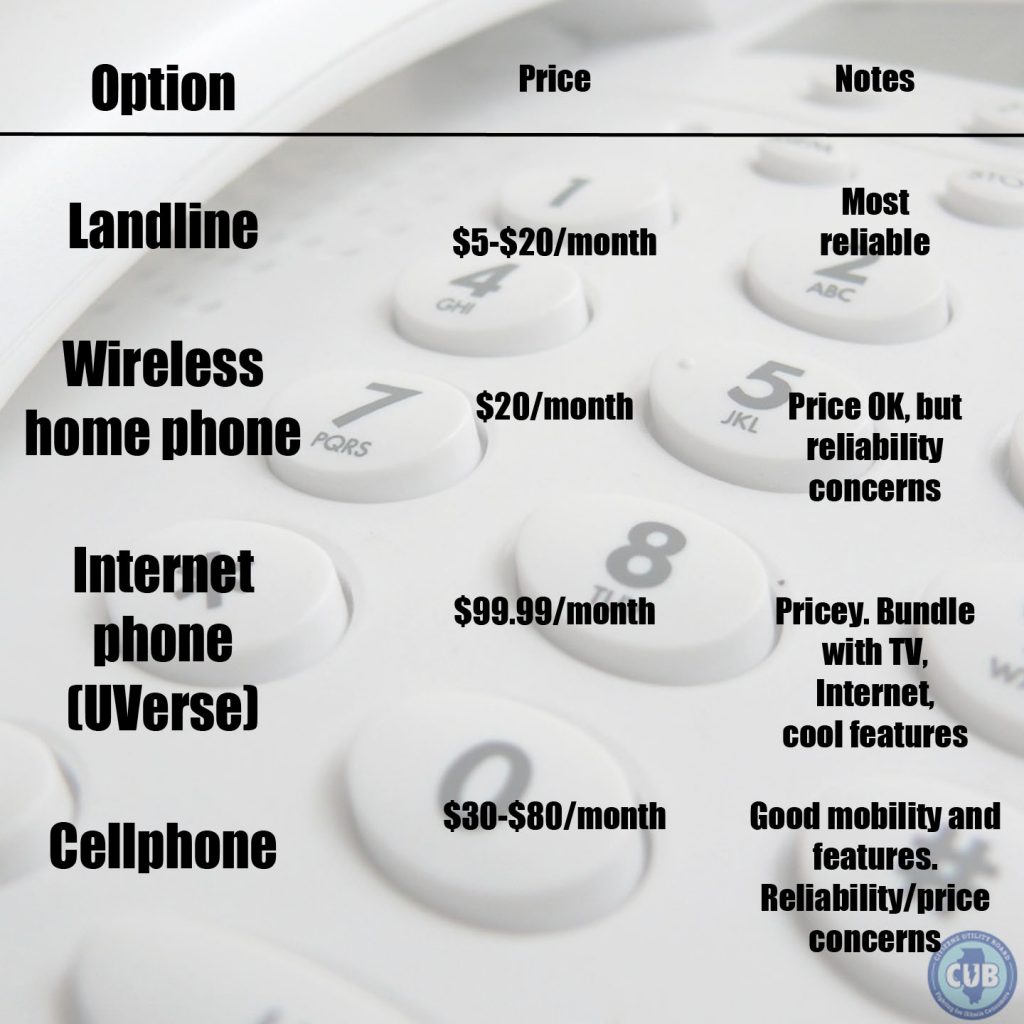In its push to eventually end landlines in Illinois, AT&T has promised that home phone service isn’t going away, it’s getting better. There are plenty of Illinois consumers who, along with CUB, dispute that.
CUB did an analysis of AT&T’s phone options:
Landlines:
Pros: Landlines are reliable and, at around $20 or less a month, are, still among the cheapest options available to consumers–even with the cancellation of AT&T’s Consumer’s Choice plans. (They are the best local phone deals in Illinois, but in November, AT&T is changing their names and raising their prices.)
Cons: You can’t take your landline with you to the grocery store, like you can your cellphone. (However, that hasn’t been a concern of consumers attracted to this option’s reliability–particularly those with medical monitoring devices or other health issues.)
Cellphones: Most cellphone plans include unlimited talk and text, with data usage fees. Not including the cost of the phone itself, a single plan with unlimited talk and text and data usage ranges between $30 and $80, including monthly line fees. These are averages. Prices will vary based on the number of lines, and data plans vary across networks.
Pros: Cellphones are the most portable and have the most features, if you own a smartphone. You can download applications that allow you to read the news, watch movies or play games.
Cons: Cellphones generally aren’t cheap, although there are reasonable prepaid plans available. Unlike traditional landlines, cellphones need to be charged, they can be plagued by poor service in “dead zones,” and they may leave 911 dispatchers guessing about your location. Advanced 911—which can trace the exact location of a cellphone—won’t be fully implemented in Illinois until 2020, at the earliest. AT&T’s 14-state wireless 911 outage earlier this year doesn’t give traditional landline customers confidence that the company can provide satisfactory alternatives.
Bundled Packages: The AT&T service traditionally called “UVerse” includes a bundle of TV, Internet and home phone. For the first two-year contract, the company charges $99.99 a month.
Pros: These bundles are a one-stop- shop for TV, Internet and home phone, if you’d rather have the convenience of going to one company as opposed to looking for separate ones for each service. Often times the services can work in unison, as your cable box can use the Internet to connect to streaming services, web browsers or to look up channel and show information. There are also some nifty features, like Caller ID on your TV screen.
Cons: Digital phone service like this requires a pricey broadband connection, and you can’t make calls during an Internet outage or a power outage (without a battery back-up).
AT&T’s Wireless Home Phone: The service allows users to connect their home phone to AT&T’s wireless network, offering them unlimited talk and features like voicemail and caller ID for $20 per month. Note: This service uses a “mobile device” to connect a home phone to AT&T’s wireless network. You pay a $45 activation fee, plus $99.99 for the device (if you don’t sign a 2-year contract).
Pros: More mobile than traditional landline and usually cheaper than Internet phone service or cellphone service.
Cons: The price is not bad, but there might be reliability issues with this choice. AT&T warns that the service “is not compatible with home security systems, fax machines, medical alert and monitoring services, credit card machines, IP/PBX Phone systems, or dial-up Internet service.”


